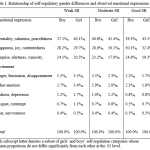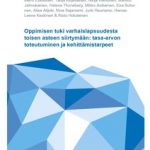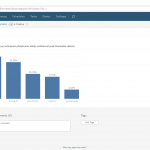 An article by Jouni Veijalainen, Jyrki Reunamo and Minna Heikkilä (Early gender differences in emotional expressions and self-regulation in settings of early childhood education and care) has been accepted for publication in the journal Early Child Development and Care. The article is based on the Progressive feedback data. According to the results, boys practice their self-regulation skills in a different context than girls. Perhaps boys practice their SR skills with a higher intensity of emotions than girls. This may lead to a situation in which boys more easily get into trouble in a school with rules and a low tolerance for disturbance. If boys and girls have different criteria for SR skills in kindergarten, their ability to prohibit their emotions later are different. Is the school ready for both girls’ and boys’ different criteria for SR skills?
An article by Jouni Veijalainen, Jyrki Reunamo and Minna Heikkilä (Early gender differences in emotional expressions and self-regulation in settings of early childhood education and care) has been accepted for publication in the journal Early Child Development and Care. The article is based on the Progressive feedback data. According to the results, boys practice their self-regulation skills in a different context than girls. Perhaps boys practice their SR skills with a higher intensity of emotions than girls. This may lead to a situation in which boys more easily get into trouble in a school with rules and a low tolerance for disturbance. If boys and girls have different criteria for SR skills in kindergarten, their ability to prohibit their emotions later are different. Is the school ready for both girls’ and boys’ different criteria for SR skills?
Category Archives: Special needs
Supporting children’s special needs
 Two new articles on supporting children’s special needs have been published a Finnish Government publication. The articles are based on the Orientation Project data with 9554 observation of children with special needs with a random sample covering 40% of Finnish early education. Unfortunately only the abstracts are in English and Swedish.
Two new articles on supporting children’s special needs have been published a Finnish Government publication. The articles are based on the Orientation Project data with 9554 observation of children with special needs with a random sample covering 40% of Finnish early education. Unfortunately only the abstracts are in English and Swedish.
PF & dSign
 Vertti Kivi (dSign Vertti Kivi & Co) has created an interior design for a harmonious, exiting and playful kindergarten for our project. The design has a great variety of surroundings and moods inspired by Finnish forest. Especially inspiring are the adaptable (automatic, programmable, creative or manual) lighting designs, for example, sunrise, noon, sunset, moonlight and starlight. You can see world in a different light. In the end, all we ever see in this world is light.
Vertti Kivi (dSign Vertti Kivi & Co) has created an interior design for a harmonious, exiting and playful kindergarten for our project. The design has a great variety of surroundings and moods inspired by Finnish forest. Especially inspiring are the adaptable (automatic, programmable, creative or manual) lighting designs, for example, sunrise, noon, sunset, moonlight and starlight. You can see world in a different light. In the end, all we ever see in this world is light.
Progressive feedback available for the cities and early educators
 It is one small step for early educator, one giant leap for early education! To start using the new progressive feedback interface with a regular web-browser. In the interface there are both readymade analysis and a possibility to edit the results in many ways, resulting in a versatile and real-time feedback for the early educators. Now the cities have access to Finnish results in real time. What’s more, now the city’s own results can be seen in comparison. We have started a new era in the evaluation, feedback and development of Early Childhood Education.
It is one small step for early educator, one giant leap for early education! To start using the new progressive feedback interface with a regular web-browser. In the interface there are both readymade analysis and a possibility to edit the results in many ways, resulting in a versatile and real-time feedback for the early educators. Now the cities have access to Finnish results in real time. What’s more, now the city’s own results can be seen in comparison. We have started a new era in the evaluation, feedback and development of Early Childhood Education.
Participation and immigrant children
A new article about immigrant children’s participation has been published. The research data includes more than 300 immigrant children observed in their daily activities. Especially peer relations are important, but the educator is the one who can help these children in positive participation. You can read the article by clicking the link below.
Arvola, O., Lastikka, A-L. & Reunamo, J. (2017). Increasing Immigrant Children’s Participation in the Finnish Early Childhood Education Context. The European journal of social & behavioural sciences EJSBS, 20 (3), 2539-2548.
Self-regulation
Self-regulation is the key when children learn to pioneer the path of their lifes and to take their life in their own hands. Jouni Veijalainen’s, Jyrki Reunamo’s and Alisa Alijoki’s article Children’s self-regulation skills in the Finnish day care environment has been accepted for publication in the Journal of Early Childhood Education Research. In the article, it is shown clearly that children’s skills are not separate but are highly intertwined. We hope that the article helps educators to see the ingredients of self-regulation better. Because social skills are also related to self-regulation, these skills expand to shared other-regulation too. It means that children learn to shape of things to come.
Funding for multicultural research
Alli Paasikivi foundation has granted Outi Arvola 21 000 euro for studying Multicultural children in early childhood education. The grant will help Outi to get the results of the Orientation to support the inclusion and well-being of multicultural children and their families.
Physical activity lessons from Finland?
 Unfortunately our results describing children’s physical activity in Early Education are published only in Finnish. The first small article about our latest results in English has just been published in Nursery World. Even though there are still a lot of things to enhance in Finland, there may also be some things that could be used in other countries too, see Jyrki Reunamo: Physical activity: some lessons from Finland).
Unfortunately our results describing children’s physical activity in Early Education are published only in Finnish. The first small article about our latest results in English has just been published in Nursery World. Even though there are still a lot of things to enhance in Finland, there may also be some things that could be used in other countries too, see Jyrki Reunamo: Physical activity: some lessons from Finland).
Supporting multicultural children
In the leading Finnish journal for educational sciences Kasvatus (Education), an article about supporting children with immigrant background in early years has been accepted for publication. In the Orientation project data there were 309 children with immigrant background, whose need for support was evaluated. Mostly, children’s skills were equal in relation to the original population, but in context specific situations there were differences. The results highlight the importance of the educator in interaction. In a multicultural environment it is important to consider the shared production of learning content and educational practices. The article info:
Arvola, O., Reunamo, J. & Kyttälä, M. (accepted for publication). Maahanmuuttajataustaiset lapset varhaiskasvatuksessa: kasvattajien näkemykset lasten taidoista ja tuen tarpeesta [Immigrant children in early years: the educators’ views about children’s skills and need for support. Kasvatus.
Funding for the study of self-regulation
Our doctoral student Jouni Veijalainen has been granted by Jenny and Antti Wihuri foundation with a 24 000 euro funding. The grant is for Jouni’s doctoral dissertation “Children’s self-regulation skills in day care”. Jouni’s data is from the 2015 data collection. In his dissertation Jouni combines children’s evaluated self-regulation skills with the observed activities, which makes it possible to study how the self-regulation skills are related to everyday activities and peer contacts in day care centres. Self-regulative skills are essential when children get practice to steer their own and also others life for a sustainable well-being.